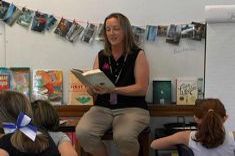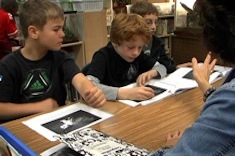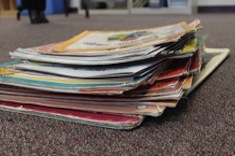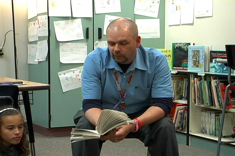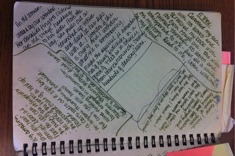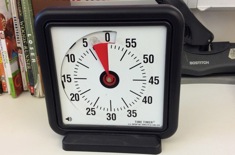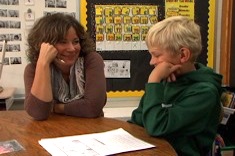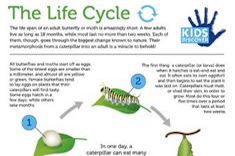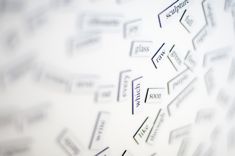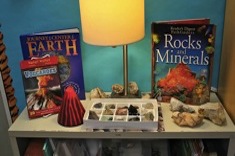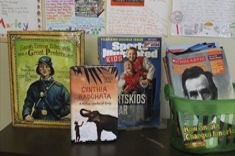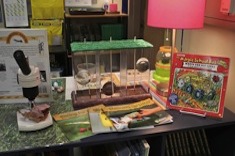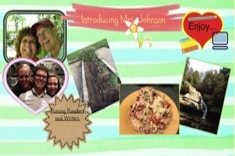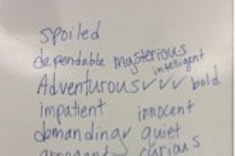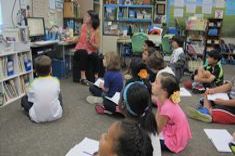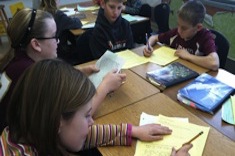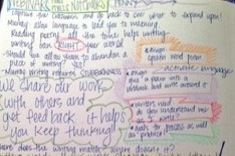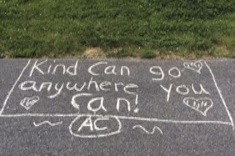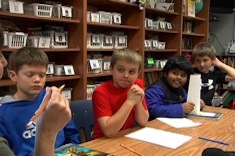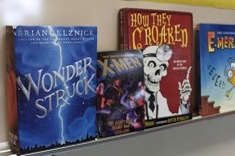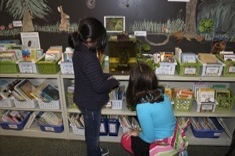4th
Latest Content
Fourth-Grade Read Aloud: Checking In
In this video from a fourth-grade classroom, Gi Reed reads aloud Small as an Elephant by Jennifer Richard Jacobson. Gi continually checks in with her students, making sure they are visualizing, noticing new vocabulary, and making connections to earlier incidents in the texts—all without breaking the flow of the story.
Owl Research Notes Group
Andrea Smith helps a group of boys take notes during an owl research project.
Using Picture Books to Foster Resilience
Gigi McAllister uses picture books to strengthen her fourth-grade classroom community.
Percy Jackson Read-Aloud in Fourth Grade
Tony Keefer demonstrates how he makes his read-alouds interactive, and explains why he selected Percy Jackson to use with this group of fourth graders.
Giving Students a Notebook Tour
Melanie Meehan finds a notebooks tour is a terrific minilesson for helping students expand the ways they use notebooks.
Notebook Sketching: Conferring with Sarah
Aimee Buckner confers with Sarah about sketching in her notebook.
Finding Pockets of Time
Gigi McAllister gives suggestions for finding pockets of time in overstuffed schedules.
Making Time for Individual Conferences
Franki Sibberson explains how longer conferences early in the year pay dividends all year long.
Making Memories Stick: Tutoring Kirk
Max Brand tutors a struggling fourth grader who produces very little writing.
Moving Away from Bed to Bed: Conferring with Ty
Ruth Ayres confers with fourth grader Ty about his personal narrative, and works to move him away from a “bed-to-bed” approach in his writing.
Infographics and the Common Core: Resources and Standards
Andrea Smith explains why infographics are more useful than ever in the age of the Common Core, and provides many links to free infographic resources on the web.
Teaching Search Skill Basics to Students
Bill Bass has advice for teaching web-based search skills to students.
The Power of Written Blind Word Sorts
Max Brand uses written blind word sorts to build student word learning skills.
Classroom Displays for Nonfiction Learning
Andrea Smith shares some of her favorite nonfiction classroom displays.
Blurring Genres and Real-Life Readers
The line between fiction and nonfiction can be fuzzy, but Tony Keefer finds what matters most is finding texts that captivate readers.
Explore: Time for Nonfiction
Andrea Smith uses Explore Time with her fourth graders to build interest in nonfiction.
The Power of a Hashtag
Katharine Hale looks at the value of hashtags in helping students harness Twitter in a reading community.
Choosing the Right Tool for Your Message
Julie Johnson has advice on classroom uses of tech resources.
Character Traits and Vocabulary Development
Gigi McAllister shares how she combines vocabulary instruction with analysis of character traits in her fourth-grade classroom.
Dictation in Fourth Grade: Conferring with Donovan
Beth Lawson helps fourth grader Donovan focus his many ideas for writing through some dictation in a writing conference.
Infusing Informational Texts into Morning Meetings: Fact of the Day and Daily News Routines
Andrea Smith explains two routines, Daily News and Fact of the Day, which are key components of her morning meetings.
Peer Evaluation of Student Writing
Megan Ginther found she was spending too much time responding to student writing, and just as important, taking on too much of the responsibility for improvement. She tackled the issue by developing a new program for peer evaluation of student writing.
Writing Homework
If your students are already comfortable with an unstructured requirement of 20-30 minutes of reading each night, you may find adding 10 minutes of writing at home works wonders in fostering writing skills. Katherine Sokolowski explains how the assignment works in her classroom.
Conferring About the Author
Beth Lawson confers with a fourth grader about her “about the author” blurb, a great chance to learn more about students’ home passions.
Spreading Out the Fun
Why save all the most enjoyable literacy activities for May or June? Gigi McAllister spreads out the fun all year long with literacy events and activities to break up routines.
“Lift a Line” Boys Reading Group
Franki Sibberson gives a group of boys a “lift a line” assignment to build their close reading skills.
Can Books Harm Children? Support and Censorship
Shari Frost asks a provocative question: Can books harm children? She explores practical ways for teachers to walk the fine line between support and censorship in matching books to students.
Teacher as Mentor Writer
Tony Keefer takes the leap and commits to sharing more of his writing process with students.
Fluency and Comprehension Conference
Aimee Buckner confers with fourth grader Amanda about her reading comprehension and fluency, encouraging her to use a sticky note to track thinking around a focus question.
Inviting Book Tub Titles: Nonfiction Library Redesign
Andrea Smith discovers the value of more creative nonfiction book tub titles after listening to ideas from her students.
Browse Content By
Type
Category
- Assessment Tools
- Big Fresh Archives
- Booklists
- Choice Numeracy
- Classroom Design
- Common Core
- Community Building
- Conferring
- Content Literacy
- Digital Literacy
- English Language Learners
- Equity
- Family Relations
- Free Samples
- Guiding Groups
- Leadership
- Literacy Coaches
- Mentor Texts
- Minilessons
- New Teacher Mentors
- Podcasts
- Poetry
- Quote Collections
- Reading Strategies
- Self Care
- Struggling and Striving Learners
- Talking and Listening
- Teacher Study Groups
- Teaching Reading
- Teaching Writing
- Word Study and Vocabulary
Author
- Melissa Quimby
- Nawal Qarooni
- Gwen Blumberg
- Julie Cox
- The Lead Learners
- Hannah Tills
- Josie Stewart
- Ruth Metcalfe
- Mallory Messenger
- Becca Burk
- Jodie Bailey
- Vivian Chen
- Mary Brower
- Tiffany Abbott Fuller
- Stephanie Affinito
- Ruth Ayres
- Leigh Anne Eck
- Heather Fisher
- Shari Frost
- Julie Johnson
- Suzy Kaback
- Gigi McAllister
- Shirl McPhillips
- Melanie Meehan
- Cathy Mere
- Debbie Miller
- Tara Barnett and Kate Mills
- Tammy Mulligan
- Dana Murphy
- Bitsy Parks
- David Pittman
- Brenda Power
- Heather Rader
- Matt Renwick
- Mandy Robek
- Christy Rush-Levine
- Gretchen Schroeder
- Jen Schwanke
- Brian Sepe
- Katherine Sokolowski
- Stella Villalba
- Jennifer Vincent
Grade Level
Choice Literacy Membership
Articles
Get full access to all Choice Literacy article content
Videos
Get full access to all Choice Literacy video content
Courses
Access Choice Literacy course curriculum and training

